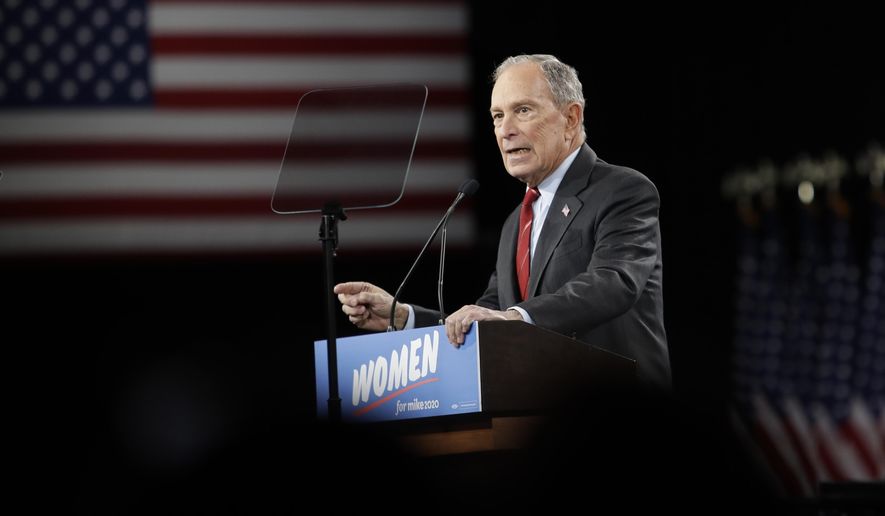OPINION:
Inequality and economic growth have been central themes in national elections since John Kennedy’s campaign.
The Clintons, Barack Obama and the latest crop headed by Joe Biden, Bernie Sanders, Elizabeth Warren and Pete Buttigieg want to give us freer access to health care, higher education (and debt forgiveness), child care and the like by taxing the wealthy.
The Bushes ran on lower taxes and free trade policies that ultimately decimated factory jobs in the heartland. President Trump won the brass ring by promising more tax cuts and America first trade agreements to bring back manufacturing.
All those promises are terribly difficult to keep.
Entitlements already account for more than 60 percent of federal spending, the deficit is more than $1 trillion and taxing wealth to pay for more giveaways will only reduce or drive abroad the capital needed to finance new ventures, R&D and growth — that would reduce the pie that can ultimately be taxed.
Democrats’ campaign promises make as much sense as offering a dog his tail for dinner.
Mr. Trump’s tax cuts boosted consumer spending but not business investment, and his tariffs and trade deals have focused too much on what can’t be retrieved or is quickly disappearing — jobs in manufacturing.
Tariffs have done more to move export sweatshops from China to places like Vietnam than Ohio. Quickly advancing robotic technology and competition mandates that those factories that do return will employ many fewer workers than those that left.
China is seeking to diversify its export markets by creating a regional trading block in Asia, while Mr. Trump has pulled the United States out of the Trans-Pacific Partnership.
Beijing is investing heavily in the next wave — artificial intelligence, which both destroy service jobs like insurance adjusters and drivers and create new ones for software programmers and engineers. Meanwhile, the Trump administration is increasingly hostile to many big tech companies critical to our progress.
Mr. Trump’s trade and industrial policies are too often like playing hockey without a goaltender.
The rise of the superstar cities on the two coasts and in the South, Boston, Seattle, Austin and others — and recent migratory patterns demonstrate taxes are not as important as world-class universities and highly-skilled workers for attracting high-paying jobs. Still, taxes matter more than Democrats want to admit but less than Republicans claim.
California, New York and Illinois are losing more residents than they are attracting from other states, especially income-tax free Texas and Florida. The leavers appear to be concentrated among the very well off who can take their careers and wealth with them and the working class earning less than $50,000. The latter indicates housing costs and how well taxes are spent on public transportation, education and other vital services matter a lot.
The rural South and small towns and cities in the Midwest are falling further behind the rest of the country. Those places are isolated and young folks there often lack access to skill-intensive education.
Presidential hopeful Michael Bloomberg is proposing to pick 10 cities in those regions for intensive development — grants and tax breaks to boost universities, worker training and private investment to create new technology hubs. This mirrors a proposal by the liberal Brookings Institution and would expand to 30 cities as the mold for success was established.
It all looks like what has failed before. Giving money to universities does not increase practical R&D and skills-focused education. They spend new money on teach-ins about social justice and policing the speech of faculty and students.
For decades, state and federal governments have been giving grants, tax breaks and various other free lunches to businesses to locate in lagging jurisdictions, but economists find these generally move investment around among communities rather than increase overall capital formation.
It would be better to lend money directly to traditional students and adults seeking new skills to attend school — be it for college, technical school or an apprenticeship — but require the training institutions to put up half the loans. For example, universities could float bonds backed by their land and buildings.
Then if the universities and private schools don’t adequately train their students, they don’t get paid and would face selling off their football stadiums and dining halls. Surely, that would refocus their obsessions.
Reskilling America and boosting mobility with relocation grants to workers with verifiable job offers would do more good than the federal government choosing 10 cities to advantage over the rest of the nation.
• Peter Morici, @pmorici1, is an economist and business professor at the University of Maryland, and a national columnist.




Please read our comment policy before commenting.